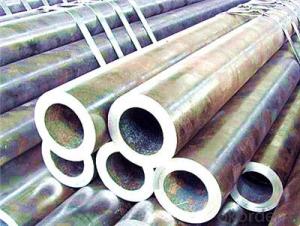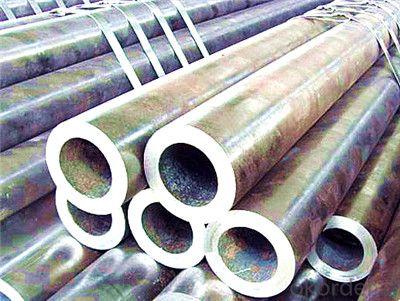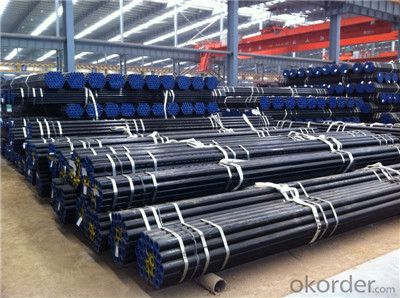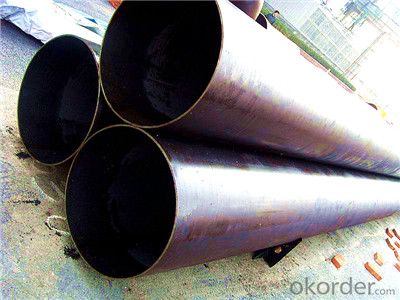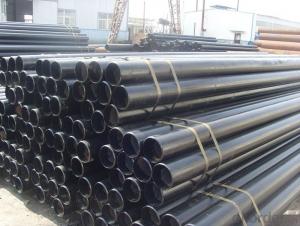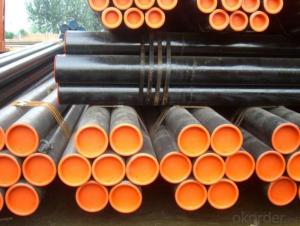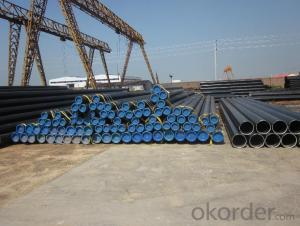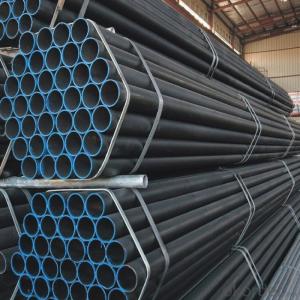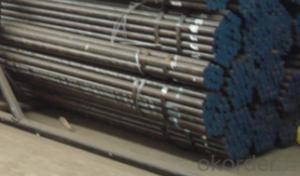GR.B Carbon Seamless Steel pipe from CNBM
- Loading Port:
- Tianjin
- Payment Terms:
- TT or LC
- Min Order Qty:
- 50 m.t.
- Supply Capability:
- 2000000 m.t./month
OKorder Service Pledge
OKorder Financial Service
You Might Also Like
PRODUCT DETAILS
1.Structure of GR.B Carbon Seamless Steel pipe from CNBM Description:
A large amount of Seamless Steel Pipes is offered to the clients at cost effective rates. These pipes are extremely durable, resistant to corrosion and have high tensile strength. Our pipes are used in nuclear plants, power plants, refineries and construction industry across the country. Furthermore, we are capable of providing these seamless pipes to the clients in bulk quantity.
2.Main Features of GR.B Carbon Seamless Steel pipe from CNBM:
• High manufacturing accuracy
• High strength
• Small inertia resistance
• Strong heat dissipation ability
• Good visual effect
•Reasonable price
3.Packaging & Delivery:
| Packaging Details: | Seaworthy packages, bundles wrapped with strong steel strip |
| Delivery Detail: | 15-30 days after received 30% TT |
4.GR.B Carbon Seamless Steel pipe from CNBM Specification:
| Standard: | GB, DIN, ASTM,ASME, ASTM A106-2006, ASTM A53-2007 |
| Grade: | 10#,20#, 45#, 16Mn |
Thickness: | 8 - 33 mm |
| Section Shape: | Round |
| Outer Diameter: | 133 - 219 mm |
| Place of Origin: | Shandong, China (Mainland) |
| Secondary Or Not: | Non-secondary |
| Application: | Hydraulic Pipe |
| Technique: | Cold Drawn |
| Certification: | API |
| Surface Treatment: | factory state or painted black |
| Special Pipe: | API Pipe |
| Alloy Or Not: | Non-alloy |
| Length: | 5-12M |
| Outer Diameter: | 21.3-610mm |
5.Product pictures
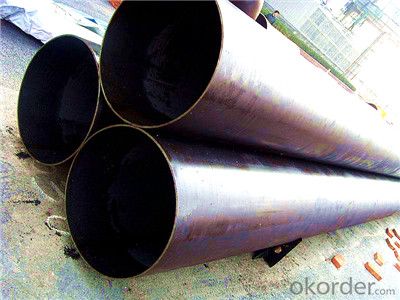
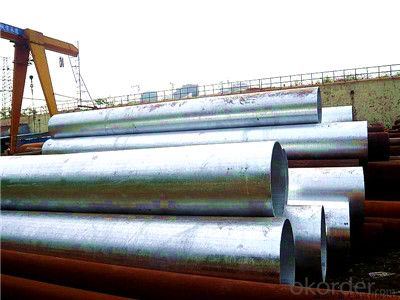
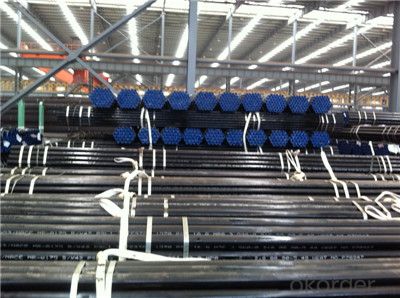
5.FAQ of GR.B Carbon Seamless Steel pipe from CNBM:
①How is the quality of your products?
Our products are manufactured strictly according to national and internaional standard, and we take a test
on every pipe before delivered out. If you want see our quality certifications and all kinds of testing report, please just ask us for it.
Guaranteed: If products’ quality don’t accord to discription as we give or the promise before you place order, we promise 100% refund.
②How about price?
Yes, we are factory and be able to give you lowest price below market one, and we have a policy that “ for saving time and absolutely honest business attitude, we quote as lowest as possible for any customer, and discount can be given according to quantity”,if you like bargain and factory price is not low enough as you think, just don’t waste your time.Please trust the quotation we would give you, it is professional one.
③Why should you chose us?
Chose happens because of quality, then price, We can give you both.Additionally, we can also offer professional products inquiry, products knowledge train(for agents), smooth goods delivery, exellent customer solution proposals.Our service formula: good quality+good price+good service=customer’s trust.
SGS test is available, customer inspection before shipping is welcome, third party inspection is no problem.
Any question, pls feel free to contact us !
- Q: What is the difference between carbon steel and cast iron pipes?
- Various industries widely use carbon steel and cast iron pipes for different purposes. The composition and properties of these two types of pipes distinguish them from each other. 1. In terms of composition, carbon steel pipes consist mainly of iron and carbon, with trace amounts of manganese, phosphorus, sulfur, and other elements. In contrast, cast iron pipes are created by melting iron and adding a small percentage of carbon, typically ranging from 2-4%. 2. When it comes to strength and durability, carbon steel pipes generally outperform cast iron pipes. Carbon steel possesses a higher tensile strength, enabling it to handle greater pressures and reducing the likelihood of damage or deformation. On the other hand, cast iron, while strong, is more brittle and prone to cracking. 3. Carbon steel pipes necessitate additional coatings or treatments to safeguard them against corrosion. If not properly protected, these pipes can be vulnerable to rust and corrosion, particularly when exposed to moisture or corrosive substances. Conversely, cast iron pipes have inherent corrosion resistance due to the formation of a protective layer of iron oxide (rust) on their surface. 4. Cast iron pipes are typically heavier than carbon steel pipes, making them more challenging to handle and install. Comparatively, carbon steel pipes are lighter, facilitating easier transportation and installation. 5. Cast iron pipes excel in sound-dampening properties, resulting in quieter fluid flow. Conversely, carbon steel pipes tend to transmit more noise and vibrations. 6. In terms of cost, cast iron pipes generally carry a higher price tag than carbon steel pipes due to additional manufacturing processes and the increased cost of raw materials. In conclusion, the distinctions between carbon steel and cast iron pipes encompass their composition, strength, corrosion resistance, weight, noise transmission, and cost. The choice between the two relies on the specific application, budgetary considerations, and environmental factors.
- Q: How are steel pipes protected against external impact or mechanical damage?
- Steel pipes are typically protected against external impact or mechanical damage through the use of various methods such as applying protective coatings, installing corrosion-resistant materials, using concrete encasement, or utilizing protective shields or guards.
- Q: What are the different methods of coating steel pipes for insulation?
- There are several methods of coating steel pipes for insulation, including applying a layer of thermal insulation material, such as foam or fiberglass, directly onto the surface of the pipe, using a heat shrink sleeve or tape to wrap around the pipe, or applying a liquid coating that hardens and provides insulation.
- Q: What is the difference between steel pipe and PVC pipe?
- Steel pipe is made from a combination of iron and carbon, giving it strength and durability. It is used for heavy-duty applications, such as plumbing and gas lines, as it can withstand high pressure and extreme temperature. On the other hand, PVC (polyvinyl chloride) pipe is a plastic pipe that is lightweight, easy to install, and resistant to corrosion and chemicals. It is commonly used for plumbing, irrigation, and drainage systems, but not suitable for high-pressure applications.
- Q: What is the difference between steel pipe and tubing?
- Steel pipe and tubing serve various purposes, but they possess distinct dissimilarities. The fundamental distinction between them stems from their shape and dimensions. Steel pipe, ordinarily circular in shape, features a hollow interior. It is manufactured in a range of sizes and thicknesses to accommodate diverse pressure and temperature prerequisites. Steel pipe frequently finds employment in construction, plumbing, and the oil and gas industries for the conveyance of fluids or gases. Conversely, steel tubing can adopt a variety of shapes, such as circular, square, and rectangular. Unlike steel pipe, tubing is typically evaluated by its outer diameter and wall thickness. Structural applications, such as building frames, automotive components, and machinery, often employ steel tubing. Another divergence between steel pipe and tubing lies in their manufacturing processes. Steel pipe is typically fashioned from solid steel billets, which are heated and stretched to produce a seamless or welded tube. On the other hand, tubing can be generated through diverse methods, including hot or cold rolling, welding, or extrusion. In terms of strength and durability, both steel pipe and tubing offer excellent qualities. Nevertheless, the particular requirements of the application will dictate which one is more suitable. Steel pipe is frequently selected for high-pressure or high-temperature applications, whereas steel tubing is favored for structural purposes or when a specific shape is necessary. In summary, the primary disparity between steel pipe and tubing resides in their shape, measurement techniques, and manufacturing procedures. While steel pipe possesses a round shape and is measured by its inner diameter, tubing can adopt various shapes and is usually measured by its outer diameter. Both steel pipe and tubing find extensive use in diverse industries, but the choice depends on the specific application and requirements.
- Q: Seamless steel tube 89X4 meters, how heavy?
- Generally seamless steel pipe wall thickness will be uneven, according to the theory, each meter is 8.3844 kilograms, but if the wall thickness is poor 20--30 wire, then the weight will increase some
- Q: How are steel pipes protected against external mechanical damage?
- Various methods are employed to safeguard steel pipes against external mechanical damage. One notable approach involves the utilization of protective coatings, which act as a physical barrier between the steel surface and external forces like impact or abrasion. Coatings can be applied using techniques such as painting, epoxy coating, or wrapping the pipe with materials such as polyethylene or polypropylene. Another means of protection is the application of external casing or encasement. This involves installing casing pipes around the steel pipes to provide an additional layer of defense. These casing pipes are typically composed of resilient materials such as concrete, PVC, or ductile iron, which are resistant to external mechanical damage. Moreover, steel pipes can be safeguarded through the implementation of supports and restraints. Properly designed supports and restraints aid in evenly distributing external forces and preventing excessive stress or deformation on the pipe. This can be achieved by employing hangers, clamps, or brackets to secure the pipe in place and minimize the risk of mechanical damage. Furthermore, protective measures can be employed to prevent accidental impacts or collisions that may harm the steel pipes. This can involve the installation of protective barriers, fencing, or warning signs to alert individuals to the presence of pipelines and prevent inadvertent damage. In conclusion, a combination of protective coatings, casing, supports, and preventive measures are utilized to ensure the protection of steel pipes against external mechanical damage. These measures are crucial in maintaining the structural integrity of the pipes and ensuring their long-term performance and reliability.
- Q: What are the different types of steel pipe coatings for corrosion protection?
- Some of the different types of steel pipe coatings for corrosion protection include epoxy coatings, polyethylene coatings, zinc coatings, and coal tar enamel coatings.
- Q: What are the factors to consider while selecting steel pipes for a project?
- When selecting steel pipes for a project, some important factors to consider include the intended application or purpose of the pipes, the required strength and durability, the size and dimensions needed, the corrosion resistance requirements, the availability and cost, and any specific industry standards or regulations that need to be met.
- Q: Are steel pipes resistant to UV degradation?
- No, steel pipes are not resistant to UV degradation.
Send your message to us
GR.B Carbon Seamless Steel pipe from CNBM
- Loading Port:
- Tianjin
- Payment Terms:
- TT or LC
- Min Order Qty:
- 50 m.t.
- Supply Capability:
- 2000000 m.t./month
OKorder Service Pledge
OKorder Financial Service
Similar products
Hot products
Hot Searches
Related keywords
